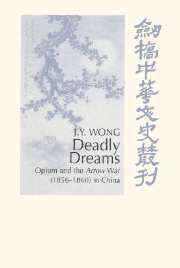Book contents
- Frontmatter
- Contents
- List of Tables
- List of Figures
- Poem by the late Mr Qin Esheng
- Foreword by Professor Wang Gungwu
- Foreword by Professor C. A. Bayly
- Preface
- Part I The confusion of imperialism
- Part II The pretext for imperialism
- Part III The personalities of imperialism
- Part IV The rhetoric of imperialism
- Part V The mechanics of imperialism
- Part VI The economics of imperialism
- Part VII The dynamics of imperialism
- Chronology of major events
- Word list
- Abbreviations
- Bibliography
- Index
Foreword by Professor Wang Gungwu
Published online by Cambridge University Press: 29 September 2009
- Frontmatter
- Contents
- List of Tables
- List of Figures
- Poem by the late Mr Qin Esheng
- Foreword by Professor Wang Gungwu
- Foreword by Professor C. A. Bayly
- Preface
- Part I The confusion of imperialism
- Part II The pretext for imperialism
- Part III The personalities of imperialism
- Part IV The rhetoric of imperialism
- Part V The mechanics of imperialism
- Part VI The economics of imperialism
- Part VII The dynamics of imperialism
- Chronology of major events
- Word list
- Abbreviations
- Bibliography
- Index
Summary
I am delighted that Dr John Wong has finally returned to the mid-nineteenth century to complete the study of a subject he started to work on some twenty years ago – the origins of the Second Anglo-Chinese, or ‘Opium’, War. Having read with great interest his splendid study of Viceroy Yeh Ming-ch'en (Cambridge, 1976) and what happened to the documents of the Viceroy's yamen (Oxford, 1983), I knew he would produce an equally authoritative examination of the breakdown of Anglo-Chinese relations in 1856, which he intimated he might do during the 1970s. He was distracted from doing so for several years by a project which engaged his attention in the early 1980s, a project which honed his skills in historical detection further: the pursuit of the origins of Sun Yatsen's ‘heroic image’. After that was published (Oxford, 1986), he was ready for another kind of pursuit and returned to his earlier subject with a much larger prey in mind. This time, it was the pursuit of that well-hunted but elusive animal, that beast called ‘imperialism’.
Dr Wong recognizes that the beast takes many shapes and comes in many disguises. For our story, it first showed its ugly face in a most unlikely object, a Chinese lorcha named the Arrow. Once that was identified, the author set his sights from every angle until the shape of the animal was exposed.
- Type
- Chapter
- Information
- Deadly DreamsOpium and the Arrow War (1856–1860) in China, pp. xix - xxPublisher: Cambridge University PressPrint publication year: 1998



